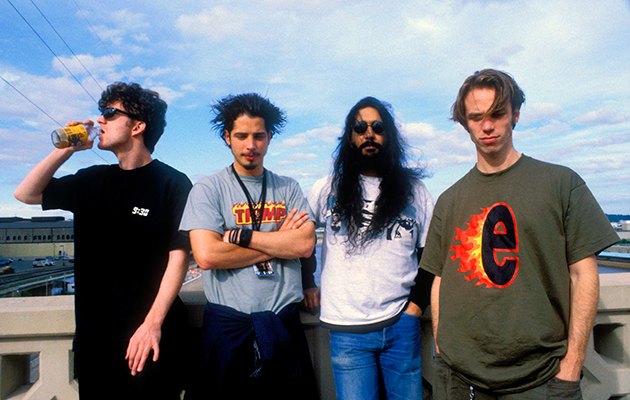BEINHORN: I worked hard to get a drum sound and everything was built up from that. We added some distorted vocals and then Kim did his solo – actually two solos that we faded and cross-faded.
CORNELL: There was a sparkle the demo had that the band version didn’t, and we couldn’t work out what it was. We even sourced the same Leslie cabinet I’d used. I’d figured we’d get a better Leslie cabinet for the record but it didn’t sound the same.
BEINHORN: It wasn’t a normal rotating Leslie speaker, it was more unusual, a joint venture between Fender and Leslie.
CORNELL: I’d rented it, but the rental company had sold it to a band and I had to find the band and beg them to let me borrow it. We took it the studio and it was exactly right but there was something that still wasn’t happening. I’d forgotten that when
I cut the demo it was too slow, so I’d vari-speeded it up on the tape which changes the key, then sang over the top. Suddenly that sparkle was there.
THAYIL: It’s just slightly faster, 1 or 2%. It gives a little more bounce and energy, a psychological lift to how we interpret a song rhythmically. In this case it would also benefit the arpeggio guitar parts, the little delicate floral chords.
CORNELL: Michael had me sing it maybe 11 times, and he was going to comp it – poring over every take, picking the best bits and sticking them together. It took him two days. I hated it, it made me feel I was a bad singer.
BEINHORN: I was really impressed. To get an artist who can analyse his own work that way is pretty rare. He was right on the money, it wasn’t good enough. I realised he was very adept at recording at home, so I showed him how to work the tape machine and left him to it. The next day he came in with a big smile on his face.
CORNELL: Sometimes when you try to communicate with somebody else they may not understand so you just give up. On my own, I could experiment. Since then, I’ve sung everything by myself.
BEINHORN: A&M wouldn’t release it as the first single. I think they were feeling cocky, they knew people would play it anyway.
CORNELL: Because the radio stations were playing it, we had to make a video.
THAYIL: I hate making fucking videos. Videos are for dancers and models. Fortunately this video required very little of us.
CORNELL: Up to then we’d been hands on with our videos to such a degree they never seemed to work. With “Black Hole Sun”, I told director Howard Greenhalgh to do what he wanted and we would pretend to play and not even look particularly good doing it.
SHEPHERD: We told them we weren’t going to perform. We just stood on boxes in the green room – it’s a blue screen now, but then it was green.
CORNELL: You can see we are just standing there, we’re not emoting. Because of that, his vision came across, the juxtaposition of a band looking bored, the song and the images he created really worked. It was a magic formula.
THAYIL: It was cynical, a bit nasty, and all we had to do was stand there and pose with our guitars like we did in our living rooms when we were kids.


